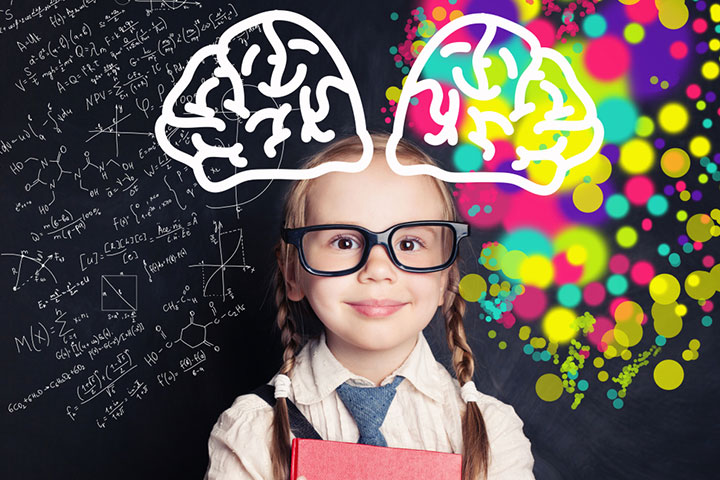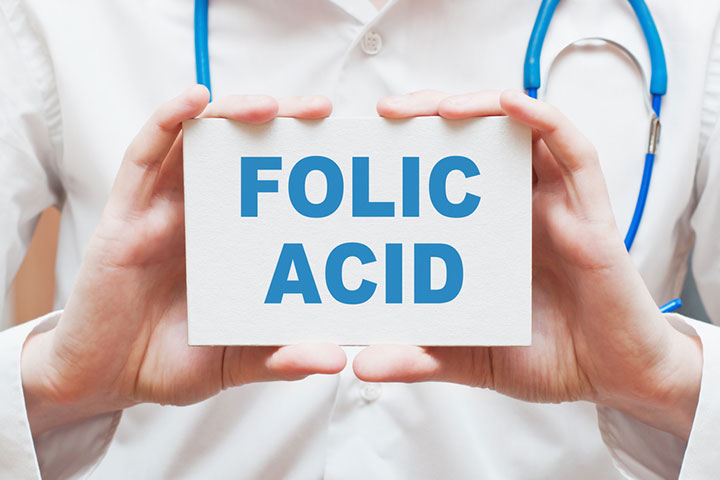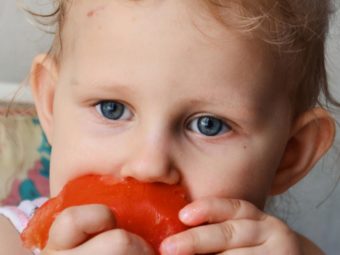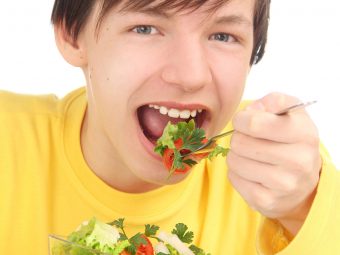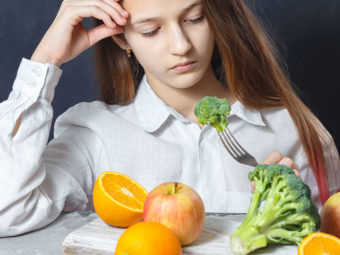
Image: ShutterStock
The benefits of eggs for kids are aplenty, and eggs are an excellent source of protein, iron, vitamins, and fats.But it should also be noted that you should refrain from giving too much egg to your little ones as it is a high source of protein and might adversely affect the kidneys if eaten in excess amounts. Too many eggs might also cause bloating and vomiting. Therefore, it is advised that children should have only about two eggs a day so that they may get other nutrients from different foods as well. Continue reading this post as we talk about the benefits of eggs for children and the ideal quantity for consumption.
Nutritional Values Of an Egg For Kids
Here is a per egg nutritional chart for you:
| Calories | 80 |
| Protein | 6.3 grams |
| Carbohydrates | 0.6 grams |
| Total Fat | 5.0 grams |
| Sodium | 63 milligrams |
| Cholesterol | 213 milligrams |
How Many Eggs Should Your Kid Eat In A Day/Week?
There is no particular limit on the number of eggs a child can consume in a week, but it is generally believed that four eggs are ideal to ensure they get the required nutrients and to prevent the risk ofhigh cholesteroldue to excessive consumption.
There is no harm in your child eating one egg a day. Feed eggs to your child with a combination of delicious foods to ensure they get all the nutrients, instead of overfeeding them with just one type of food.
Top 10 Health Benefits Of Eggs For Kids
The next time your child complains too much about eating eggs, you can list him the benefits of eggs given below!
1. Complete protein
Image: IStock
Eggs are a complete protein food. Each egg contains 6 grams of protein per serving.
- Proteins are the building blocks for a young body and are required for new cell generation and regeneration of cells. Eggs help kids grow bigger and stronger.
 Quick fact
Quick fact2.Eggs contain lutein and zeaxanthin
Based on theCenters for Disease Control and Preventiondata, around 6.8% of children under 18 in the US have been diagnosed with eye and vision conditions. Eggs are an excellent source of lutein and zeaxanthin, which are essential for healthy eyes.
- They keepvision sharpand reduce the impact of macular degeneration.
- They also ensure the health of the retina.
3. Eggs contain choline
Image: Shutterstock
Choline helps in building the membranes of the cells.
- It is also important for the development of the brain.
- Choline is also responsible for the molecules of the brain which signal the nerves. 1 egg contains 100 mcg of choline.
4. Eggs contain omega-3s
Omega 3 are healthy fats found predominantly in fish.
- Omega 3helps in early brain development and cognitive memory.
- Regular consumption of eggs can help delay the onset of arthritis and heart diseases as the kids mature into adults.
5. Eggs are replete with vitamin-D
Image: IStock
Eggs are an excellent source of vitamin D .
- Vitamin D is important for the bone health ofgrowing kids.
- Egg is the only food based source of vitamin D.
6. Eggs help in healthy hair and nails
Eggs contain essential amino acids, which help in the growth of healthy nails and hair.
- Kids are always chewing off their nails or breaking them and eggs ensure faster regrowth.
- You can also use egg as a natural conditioner!
7. Complete balance of fats
Eggs contain the right balance of saturated and unsaturated fats which make it an excellent snack for growing bodies.
- We are fightingchildhood obesityon a global scale and hence we can feed eggs to the kids without any worries about obesity.
- 尽量水煮或煮鸡蛋,而不是油炸的!
8. Eggs have minimal cholesterol
Image: IStock
Eggs have minimal harmful cholesterol. In Fact, consumption of eggs leads to a spike in the HDL (good cholesterol).
- This is extremely important keeping in mind the global children obesity epidemic.
- You can prepare eggs with minimal fats, less oil, or boiled eggs to ensure that your kid receives adequate nutrition without the harmful effects. You may try feeding them eggs in the form of omelets with vegetables, scrambled eggs, pancakes, or eggs with runny yolk for breakfast. You may also pack these in their school lunch boxes.
 Point to consider
Point to consider9. Eggs contain B12
Eggs are an excellent source of theB12 vitamin. It is better to get this vitamin naturally, thank in pill form.
- Vit B12 is essential for neural health.
- This vitamin is also called cobalamin. It is important for yourchild’s brainand nervous system development.
10. Eggs contain folic acid
Image: Shutterstock
This water soluble vitamin is equally essential for the neural health of kids.
- A folate deficiency can lead to weakness and nerve damage.
- So, it is essential to load up on eggs for the right dose of folic acids.
All these egg benefits for kids reiterate the importance of eggs in their diet. Try and incorporate eggs in as many forms as possible as it is a versatile food.
Can Kids Eat Raw Eggs?
TheAAPsays, “Don’t allow your child to eat raw or partially cooked eggs, or products containing raw eggs.”
Frequently Asked Questions
1. At what age can I give eggs to my child?
It is advised that you start including eggs in your child’s diet after they are about six months of age (1).
2.做鸡蛋fight memory loss in children?
Eggs are a rich source of choline, which is known to nurture brain functions and memory skills. Therefore, they may be considered to help reduce the risks of memory loss (2).
3. What are some alternative protein sources if my child doesn’t like eggs?
Pulses, quinoa, soya beans and its products, cereals, nuts, seeds, lean meat, dairy products, and fish are some of the various protein sources a child can consume if they can’t eat eggs (5).
4. Can eating eggs improve a child’s immunity?
Eggs are one of the most affordable sources of protein and calcium for kids. Consuming one egg per day helps in the proper development of your child’s brain and cognitive memory. It also aids in strengthening their bones and muscles. However, eggs should be consumed in moderation to avoid the risk of high cholesterol. Therefore, give your child an appropriate amount of eggs to help them get their full benefits. You should also include other vegetables and fruits in their meals to make a balanced diet.
Infographic: Egg Recipes For A Wholesome Breakfast
An egg is undoubtedly one of the most nutritious foods for children due to its vast nutritional content of vitamins, minerals, protein, and calories. So let your child get the required strength and energy for the day by feeding them tasty egg breakfasts with these easy recipes.

Illustration: Momjunction Design Team
Get high-quality PDF version by clicking below.
Download Infographic
Key Pointers
- Eggs are a good source of protein, vitamins (B12 and D), and iron and offer several health benefits for children.
- The AAP recommends that children avoid consuming raw or partially cooked eggs.
- Consumption of eggs can aid a child’s growth and development, improve vision and heart health, and help manage obesity.
- Eggs contain choline and omega 3 fatty acids, which play a vital role in children’s brain and cognitive development.
- Eggs are widely available, easy to prepare, and versatile, making them a great addition to various meals for children.
References:
- Eggs for Babies and Children, Australian Eggs.
https://www.australianeggs.org.au/nutrition/babies-and-children - Best Foods for a Healthy Brain, NorthWestern Medicine.
https://www.nm.org/healthbeat/healthy-tips/nutrition/best-food-for-a-healthy-brain - Joshua L. Hudson, et al.; (2021); Dietary Protein Requirements in Children: Methods for Consideration.
https://www.ncbi.nlm.nih.gov/pmc/articles/PMC8147948/ - What About Cholesterol, Eggs and Kids?
https://www.chla.org/blog/rn-remedies/what-about-cholesterol-eggs-and-kids - How to get protein without the meat; British Heart Foundation
https://www.bhf.org.uk/informationsupport/heart-matters-magazine/nutrition/protein/how-to-get-protein-without-the-meat# - Are eggs good for you or not?
https://www.heart.org/en/news/2018/08/15/are-eggs-good-for-you-or-not




